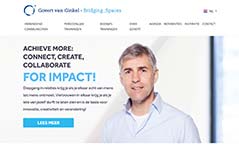Why Not Every Prejudice Is a Disadvantage
Let’s talk about cognitive bias — in other words: the prejudices in our thinking.
You might already have a prejudice about having a prejudice, without ever wondering whether it could actually be a good thing. As you’re reading this, you might think: “Wait… what?” Exactly! Of course, I don’t know you personally, but I suspect you’re reacting that way because you’ve always assumed that prejudice is mostly wrong or unjust.
But… having a negative judgment about prejudice is, of course, a prejudice itself. So even that judgment might not be entirely fair. Funny, isn’t it?
That’s why it might be wiser to recognize and understand our biases, rather than reject them all out of hand.
Positive Prejudices – Yes, They Exist!
Our brains are efficient. They save energy and time by quickly classifying situations, or for example people, and animals as safe or dangerous. This happens based on past experiences or recognizable signals. It helps us react quickly in situations that seem threatening.
Imagine this: you see something that looks like a snake. You jump back before you’ve had a proper look. Maybe it was just a garden hose — but maybe it wasn’t. That split-second reaction could save your life. Acting too quickly might sometimes be a mistake, but not acting at all could be fatal. So better an overreaction than no reaction at all.
Another positive bias is excessive optimism, especially in new situations. You might know that quote from Pippi Longstocking: “I’ve never done it before, so I think I can do it.” That mindset encourages you to try new things. It can lead to growth and unexpected success, even without experience. Of course, optimism doesn’t always reflect reality. But when combined with a healthy dose of realism, it can take you far.
The Other Side: Limiting Beliefs
On the flip side, you might think: “I’ve never done this before, so I probably can’t do it.” That’s also a form of prejudice — and a limiting one at that. You’re ruling yourself out before even trying. A little realism can help bring these kinds of assumptions into perspective.
Another common bias is believing that your knowledge is already complete. You assume you know enough, and that other perspectives don’t matter. This mindset closes you off to new information. It limits your ability to learn and grow. It also makes collaboration more difficult: you surround yourself with like-minded people and dismiss others — even though they might actually complement you.
Confirmation Bias: The Need to Be Right
This form of self-assurance is closely related to what we call confirmation bias. That’s the tendency to only seek out or accept information that confirms what you already believe. As soon as something matches your opinion, you think: “See? I was right!”
In science, you also begin with an assumption — a hypothesis — but the goal is to test it critically. With confirmation bias, thinking stops as soon as the first bit of confirmation appears. You stop examining whether things might actually be different. And that limits your insight.
Prejudices: Helpful and Harmful
In this text, when we speak of “prejudices,” we’re not only talking about the socially charged kind (like racism or sexism), but also about the automatic thought patterns and mental shortcuts our brains constantly use. These can help us — but sometimes mislead us, too.
The point isn’t to avoid all prejudices, but to recognize them, look at them critically, and balance them with openness and realism. When we do that, our biases become tools — not traps — in our thinking.
Govert van Ginkel
This article is written by Govert van Ginkel. Govert specializes in Nonviolent and Effective Communication and is active in this field as a trainer, speaker, coach, and mediator. More information about Govert can be found here. The current training offer can be found here
Introduction-evening Nonviolent and Effective Communication
Are you curious about Nonviolent and Effective Communication but still wondering what it could do for you? Join us at the introduction evening and learn more!
more infoInspiration
Register for the ‘Nonviolent and Effective Communication Inspiration newsletter’
In-company training and accredited
company training
For companies, Govert offers customized training to suit your specific needs. Govert also provides accredited (in-company) training for mediators, interpreters, and other professionals.

















